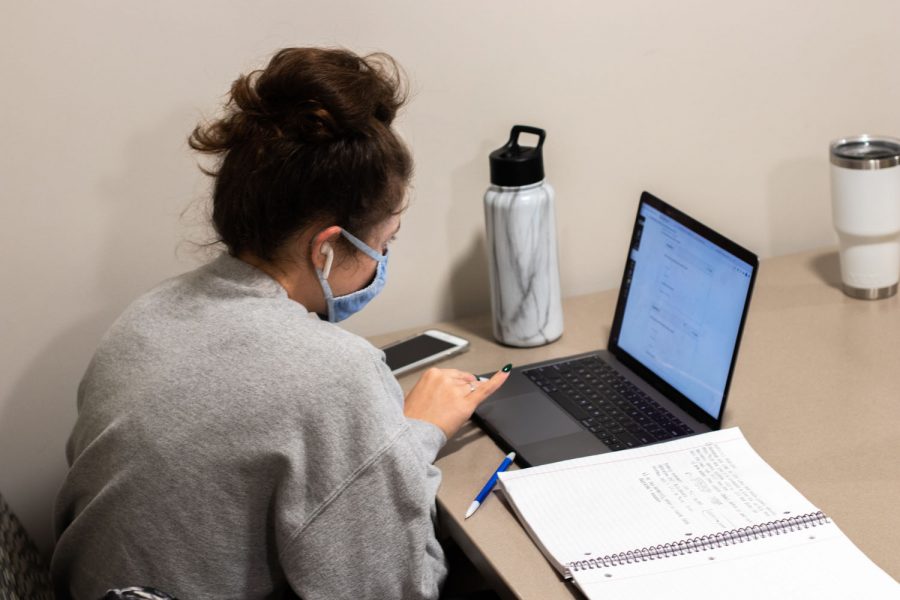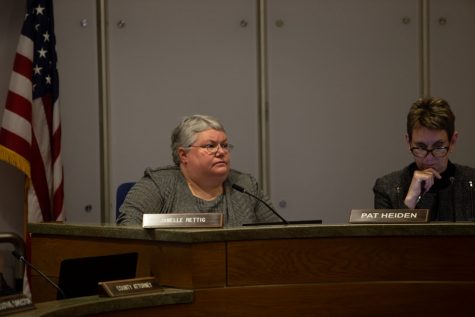University of Iowa professors, students adjust to new formats of online testing
Some professors have opted for more numerous exams worth less points while others have employed extensive proctoring software.
Photo Illustration by Kate Heston
October 15, 2020
As University of Iowa students and professors reach the halfway point in the semester when students normally pile into lecture halls for in-person midterm exams, both have had to adapt to new methods of testing and some professors have restructured their entire exam schedule this semester.
UI Professor in the Department of Political Science Frederick Solt said the new format of online education has restructured the way he offers exams for an asynchronous class — which involves posting class material on the UI’s Iowa Courses Online (ICON) site without hosting class at a set time every week.
He said typically his students take just two exams throughout the semester: a midterm and a final, both worth a quarter of the students’ grade. Because of the pandemic and the transition to operating online, he said he wanted to avoid heavily weighted exams that could significantly impact a student’s grade in the class if they do poorly on one of them.
Instead, Solt split the two exams into eight quizzes taken every one-to-two weeks. He said the class has taken four already.
“With there being so much stress in everyone’s lives this semester, I really tried to avoid this high-stakes testing that we’ve had in the past,” Solt said. “This semester we’re going to have eight exams; we’ve had four so far and the fourth one is this week…so that credit is dispersed over many more shorter exams so there’s no chance that just one bad day throws you off.”
Solt said he is not using any kind of proctoring software on his quizzes, which supervises students taking an online test, and that quizzes are relatively short with some multiple-choice questions and a couple of short essay questions.
“I’m really putting trust, I suppose, in the students,” Solt said. “I’d rather have a little bit of cheating at the edges than assume that all students are cheating.”
Solt said a benefit to posting class material online, as opposed to delivering the material in-person in a lecture hall, is that students can go back and review the material at any time, instead of having to rely on classmates for notes like they would if they had otherwise missed a lecture.
He said ICON allows him to see what course materials students have viewed to a certain extent, so if a student misses a question on an exam and wants to know where they could find the information, Solt can direct them to the specific video/slide relating to the topic.
“The fact that we have all the old lectures online I think is really helpful,” Solt said. “I mean not everybody’s taking advantage of that, but the people who email me, I get to tell them look, you can go back and review this stuff.”
Solt said he thinks even when he can get back to the lecture hall, he could potentially make the lecture videos available for students to supplement in-person instruction.
UI fourth-year Kinsey Gudenkauf, who is studying biochemistry and chemistry, said every class she’s taking exams in is hosting them online, though only one of them is using a proctoring system.
RELATED: UI spent hundreds of thousands to upgrade Zoom, other online learning software
Even so, she said the proctoring software is not very strict and really only tracks eye movement as an indicator of potential academic dishonesty.
“It’s not fully proctored, it’s just half-proctored, so there’s not a person watching it with a lockdown browser or anything like that,” Gudenkauf said. “I know there’s another camera on you and if you move your eyes around too much or whatever, you get kicked out.”
Gudenkauf said she hadn’t personally had any issues taking exams through the software, but she had heard at times it can kick people out for no reason.
UI first-year Jordan Luna, who is studying neuroscience, said he had taken a midterm for his biology class that used the test-proctoring software Proctorio, which made the exam harder than what he imagined if COVID-19 were not a factor.
Luna said he expects final exams at the end of the semester to be similar, though he’ll be able to take them from home rather than on campus when all classes go online after Thanksgiving break.
“I looked away for a solid minute, not even thinking about the factors being proctored and they were like, go ahead and scan your room and make sure you’re not cheating,” Luna said. “I wasn’t cheating, I ended up being fine but that gets intense.”




















